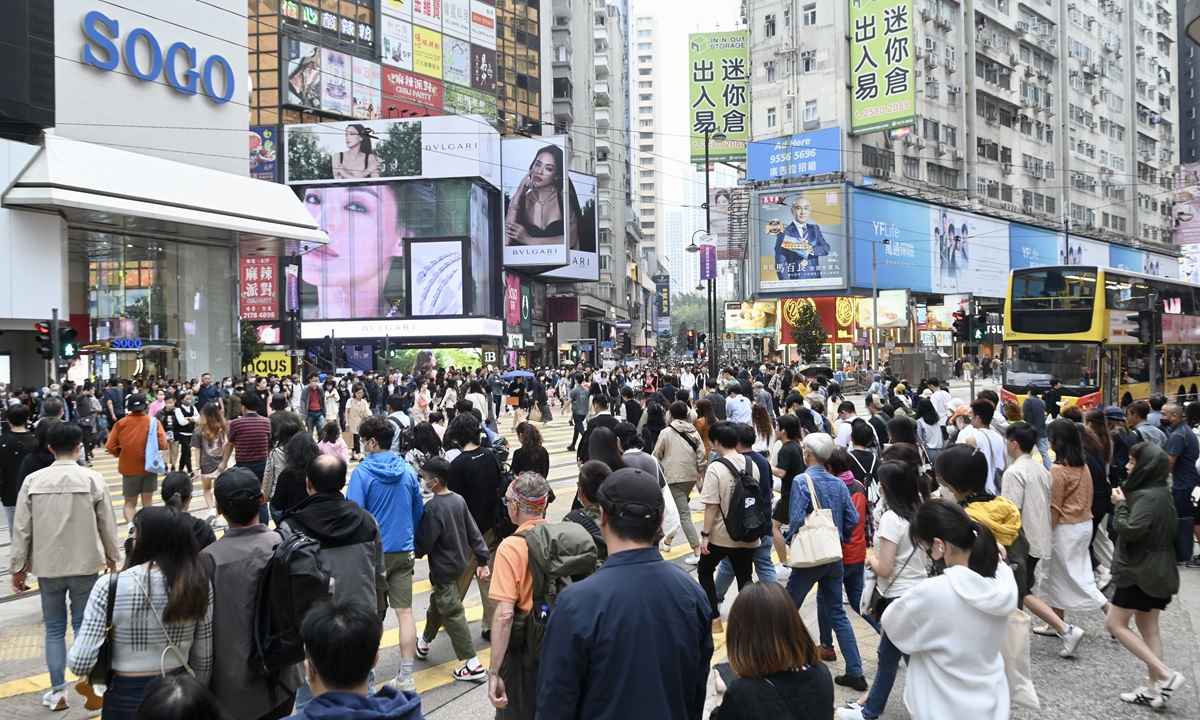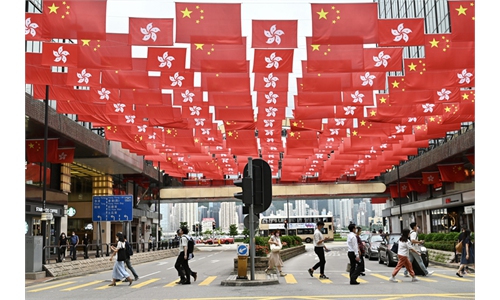
The streets of Causeway Bay, a famous shopping area of Hong Kong Special Administrative Region, are crowded with people on March 19, 2023. According to statistics released by local government, the number of mainland tourists visiting Hong Kong reached 102,458 a day earlier. Photo: VCG
As authorities in the Hong Kong Special Administrative Region (HKSAR) stressed that the local banking sector is resilient despite bank meltdowns in the US and Europe, local banks have seen a surge in the account openings and enquiries in recent days, the Global Times learned.
The opening of many accounts and accompanying capital inflows are regarded as a "vote by feet" by global investors on Hong Kong's position as an asset "safe haven," industry insiders said, as the HKSAR — under "One Country, Two Systems" — is not only home to a well-developed financial market that lives up to the highest global standards but more importantly derives its financial stability from the backing of the central government and development dividends created by the rapidly growing Chinese mainland market.
Hong Kong is set to further cement the momentum with a raft of measures to attract international high-net-worth individuals and billionaires, including tax incentives to be unveiled during the upcoming Wealth for Good summit on Friday to lure family offices.
The city, one of the world's largest offshore wealth management hubs, will prepare for "golden" development opportunities after overcoming turbulence and the fallout of the pandemic during the past several years, by continuing to leverage its irreplaceable advantage as a super connector between China and the rest of the world, observers said.
"Some banks in Hong Kong have been operating over the weekend, in response to a sudden jump in demand for account openings," a financial industry insider in Hong Kong told the Global Times on Wednesday on condition of anonymity. He said that most clients are non-local residents, without giving more details.
The industry insider said the phenomenon sprang up amid the Silicon Valley Bank crisis, which he believed was a result of multiple factors. "The risk-aversion appetite is growing among the wealthiest, some of whom realized that saving money abroad is no longer a safe option," he explained.
HSBC said in a statement sent to the Global Times on Wednesday that it will pilot a special operation on March 25, opening seven days a week at three HSBC Hong Kong branches, as it has seen a significant increase in the number of overseas Hong Kong people and non-local residents using branch services.
The bank attributed the rise to the surging number of visitors to Hong Kong. .
The number of new customers who were non-local residents in February returned to the monthly average in the first half of 2019, HSBC said. Hotline enquiries about account openings also doubled in February from a month earlier.
Amid bank crises in the West, there have been discussions over whether international capital was fleeing from Switzerland and the US to destinations in Asia like Hong Kong.
The figures aren't clear yet, but the rise in bank account openings in Hong Kong appears to indicate investor's trust in the city's financial system.
The Hong Kong Monetary Authority (HKMA) has assured the public that the exposures of the local banking sector to Credit Suisse are insignificant, and the Hong Kong banking sector is resilient with strong capital and liquidity positions.
"The total assets of Credit Suisse AG, Hong Kong Branch amounted to about HK$100 billion, representing less than 0.5 percent of the total assets of the Hong Kong banking sector," it said in a statement sent to the Global Times on Wednesday.
With regard to capital inflows, an HKMA spokesperson told the Global Times that "Hong Kong handles capital inflows and outflows arising from different sorts of business needs on a regular basis."
Liao Qun, chief economist at the Chongyang Institute for Financial Studies at Renmin University of China, told the Global Times on Wednesday that the recent influx of international capital into the HKSAR was expected, as global investors decided that financial risks in the Asian markets, particularly Hong Kong, are low, a divergence from the deepening financial crisis in the US and Europe.
"Hong Kong is outright a safe haven under the 'One Country, Two Systems' principle. The trigger of the Western banking meltdown is the aggressive interest rate hikes by the US and European central banks. In contrast, China takes a prudent monetary policy with steps aligning to local economic growth, so the banking systems of the Chinese mainland and Hong Kong remain quite stable," Liao said.
Analysts stressed the strong backing of China's foreign exchange reserves of more than $3 trillion, which will serve as a stern warning to any speculators who dare to short sell local assets. Backing from the central government was the key reason for the city to withstand two rounds of financial crises in 2008 and 1997.
In the past, global capital has been concentrated in the US and European countries like Switzerland for asset preservation purposes. The shattering of confidence toward the Western banking system could be the first step in reshaping the landscape, analysts said.
The Wealth for Good in Hong Kong Summit, jointly organized by the Financial Services and the Treasury Bureau and Invest Hong Kong, will take place on Friday. The summit is to introduce preferential tax incentives to foster positive and long-term development of family office business.
Investors have high hopes for their asset portfolios in Hong Kong, not only in preserving value but also in asset appreciation, Liu Guohong, director of the Department of Finance and Modern Industries at China Development Institute in Shenzhen, Guangdong Province, told the Global Times.
"Hong Kong is deeply integrated into the development of the Chinese mainland, and the HKSAR is set to benefit from the fast recovery of the mainland economy, which will buffer against systemic financial risks in the global market," Liu reckoned. It could also woo more investors with lucrative returns.
Observers all voiced confidence that global asset inflows into Hong Kong will accelerate and the city, with its stable business environment and burgeoning financial innovation, will resolutely march toward a brighter future.



